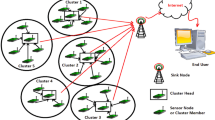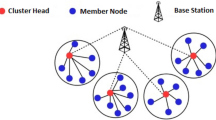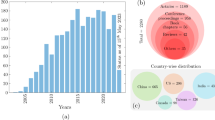Abstract
Wireless chargers provide dynamic range of power to wireless sensor network (WSN). These chargers may come under the Wireless Rechargeable Sensor Networks (WRSNs) category. The WRSNs are flexible in nature and this is further improved by introducing the mobile chargers (MCs) in WRSNs. MCs perform wireless energy transfer in WSN to replenish the energy minimized nodes. WRSNs offer controllable and predictable energy replacement to maximize the network lifetime. The availability of a single MC fails to maximize the lifetime of whole network. Therefore, multiple MCs are used in this partial charging approach to maximize the lifetime of whole network. To accomplish this partial charging process, initially the whole network is clustered by k-means clustering algorithm. Then, a deer hunting optimization (DHO) algorithm is introduced to select the Cluster Head (CH) for the selected clusters. Through the selected CH, the data transmission is performed between the source node and sink node. Next, the nodes that lost their energy during data transmission is identified using a metaheuristic algorithm namely adaptive social ski-driver optimization (ASSO). Based on the optimal result, the path is planned by multiple MCs to perform partial charging. While compared with single MC, the multiple MCs may face some coordination problems. To avoid this, the multiple MCs are co-ordinate on a distance basis, so that the complex partial charging can be achieved effectively. Partial charging improves the robustness and scalability of the entire network. Experimental results shown by the proposed approach has significantly outperforms the existing methods in terms of efficiency, network lifetime, delay, and complexity. The overall survival rate achieved by the proposed algorithm is 98% for 400 nodes, which is better than other algorithms. This is due to the introduction of an optimization for optimal node selection, whose performance has directly induced an influence in overall survival rate.










Similar content being viewed by others
References
Fulara YK (2015) Some aspects of wireless sensor networks. Int J AdHoc Network Syst 5(1):15–24
Iqbal Z, Kim K, Lee HN (2016) A cooperative wireless sensor network for indoor industrial monitoring. IEEE Trans Industr Inf 13(2):482–491
Anisi MH, Abdul-Salaam G, Idris MY, Wahab AW, Ahmedy I (2017) Energy harvesting and battery power based routing in wireless sensor networks. Wireless Netw 23(1):249–266
Kaswan A, Nitesh K, Jana PK (2017) Energy efficient path selection for mobile sink and data gathering in wireless sensor networks. AEU-Int J Electron Commun 73:110–118
Ha I, Djuraev M, Ahn B (2017) An optimal data gathering method for mobile sinks in wsns. Wirel Pers Commun 97(1):1401–1417
Garg V, Jhamb M (2013) Tracking the location of mobile node in wireless sensor network. Int J Adv Res Comput Commun Eng 2(6):2358–2362
Abdul-Salaam G et al (2016) A comparative analysis of energy conservation approaches in hybrid wireless sensor networks data collection protocols. Telecommun Syst 61(1):159–179
Peixoto JPJ, Costa DG (2017) Wireless visual sensor networks for smart city applications: A relevance-based approach for multiple sinks mobility. Futur Gener Comput Syst 76:51–62
Madhja A, Nikoletseas S, Raptis TP (2016) Hierarchical, collaborative wireless energy transfer in sensor networks with multiple mobile chargers. Comput Netw 97:98–112
Xu W, Liang W, Lin X, Mao G (2015) Efficient scheduling of multiple mobile chargers for wireless sensor networks. IEEE Trans Veh Technol 65(9):7670–7683
Sangare F, Xiao Y, Niyato D, Han Z (2017) Mobile charging in wireless-powered sensor networks: Optimal scheduling and experimental implementation. IEEE Trans Veh Technol 66(8):7400–7410
Jiang L et al (2014) Effective on-demand mobile charger scheduling for maximizing coverage in wireless rechargeable sensor networks. Mob Netw Appl 19(4):543–551
Gui T et al (2016) A novel cluster-based routing protocol wireless sensor networks using spider monkey optimization. IECON 2016–42nd Annual Conference of the IEEE Industrial Electronics Society. IEEE
Gherbi C, Aliouat Z, Benmohammed M (2016) An adaptive clustering approach to dynamic load balancing and energy efficiency in wireless sensor networks. Energy 114:647–662
Kushal BY, Chitra M (2016) Cluster based routing protocol to prolong network lifetime through mobile sink in WSN. 2016 IEEE International Conference on Recent Trends in Electronics, Information & Communication Technology (RTEICT). IEEE
Jan B, Farman H, Javed H, Montrucchio B, Khan M, Ali S (2017) Energy efficient hierarchical clustering approaches in wireless sensor networks: A survey. Wirel Commun Mob Comput, 2017
Salem AOA, Shudifat N (2019) Enhanced leach protocol for increasing a lifetime of wsns. Pers Ubiquit Comput, 1–7
Abuarqoub A, Hammoudeh M, Adebisi B, Jabbar S, Bounceur A, Al-Bashar H (2017) Dynamic clustering and management of mobile wireless sensor networks. Comput Netw 117:62–75
Huang H, Savkin AV, Ding M, Huang C (2019) Mobile robots in wireless sensor networks: A survey on tasks. Comput Netw 148:1–19
Zorbas D, Raveneau P, Ghamri-Doudane Y, Douligeris C (2017) On the optimal number of chargers in battery-less wirelessly powered sensor networks. In 2017 IEEE Symposium on Computers and Communications (ISCC), IEEE 1312–1317
Shokouhifar M, Jalali A (2015) A new evolutionary based application specific routing protocol for clustered wireless sensor networks. AEU-Int J Electron Commun 69(1):432–441
Fu L, He L, Cheng P, Gu Y, Pan J, Chen J (2015) ESync: Energy synchronized mobile charging in rechargeable wireless sensor networks. IEEE Trans Veh Technol 65(9):7415–7431
Mostafaei H (2018) Energy-efficient algorithm for reliable routing of wireless sensor networks. IEEE Trans Industr Electron 66(7):5567–5575
Tomar MS, Shukla PK (2019) Energy efficient gravitational search algorithm and fuzzy based clustering with hop count based routing for wireless sensor network. Multimed Tools Appl 1–22
Rahmati V (2020) Near optimum random routing of uniformly load balanced nodes in wireless sensor networks using connectivity matrix. Wirel Pers Commun 1–17
Sarkar A, Murugan TS (2019) Cluster head selection for energy efficient and delay-less routing in wireless sensor network. Wireless Netw 25(1):303–320
Mo L, Kritikakou A, He S (2019) Energy-aware multiple mobile chargers coordination for wireless rechargeable sensor networks. IEEE Internet Things J
Zhu Y et al (2018) Velocity Control of Multiple Mobile Chargers over Moving Trajectories in RF Energy Harvesting Wireless Sensor Networks. IEEE Trans Veh Technol 67(11):11314–11318
Rault T (2019) Avoiding radiation of on-demand multi-node energy charging with multiple mobile chargers. Comput Commun 134:42–51
Soni S, Shrivastava M (2019) Novel wireless charging algorithms to charge mobile wireless sensor network by using reinforcement learning. SN Appl Sci 1(9):1052
Liu F, Lu H, Wang T, Liu Y (2019) An Energy-Balanced Joint Routing and Charging Framework in Wireless Rechargeable Sensor Networks for Mobile Multimedia. IEEE Access 7:177637–177650
Wu R, Guo H, Tang L, Fan B (2019) Autonomous Load Regulation Based Energy Balanced Routing in Rechargeable Wireless Sensor Networks. Appl Sci 9(16):3251
Yang X, Han G, Liu L, Qian A, Zhang W (2019) IGRC: An improved grid-based joint routing and charging algorithm for wireless rechargeable sensor networks. Futur Gener Comput Syst 92:837–845
Aslam N, Xia K, Hadi MU (2019) Optimal wireless charging inclusive of intellectual routing based on SARSA learning in renewable wireless sensor networks. IEEE Sens J 19(18):8340–8351
Xie L, Shi Y, Hou YT, Sherali HD (2012) Making sensor networks immortal: An energy-renewal approach with wireless power transfer. IEEE/ACM Trans Networking 20(6):1748–1761
Lehsaini M, Benmahdi MB (2018) An improved k-means cluster-based routing scheme for wireless sensor networks. In 2018 International Symposium on Programming and Systems (ISPS), IEEE 1–6
Rajasekaran A, Nagarajan V (2018) Cluster-based wireless sensor networks using ant colony optimization. In International Conference on Intelligent Data Communication Technologies and Internet of Things, Springer, Cham 42–55
Singh B, Lobiyal DK (2012) A novel energy-aware cluster head selection based on particle swarm optimization for wireless sensor networks. HCIS 2(1):13
Brammya G, Praveena S, Ninu Preetha NS, Ramya R, Rajakumar BR, Binu D (2019) Deer hunting optimization algorithm: a new nature-inspired meta-heuristic paradigm. Comput J
Tharwat A, Gabel T (2019) Parameters optimization of support vector machines for imbalanced data using social ski driver algorithm. Neural Comput and Applic 1–14
Rajagopal A, Somasundaram S, Sowmya B (2018) Performance Analysis for Efficient Cluster Head Selection in Wireless Sensor Network Using RBFO and Hybrid BFO-BSO. Int J Wirel Commun Mob Comput 6(1):1
Azharuddin M, Jana PK (2017) PSO-based approach for energy-efficient and energy-balanced routing and clustering in wireless sensor networks. Soft Comput 21(22):6825–6839
Wang T, Zhang G, Yang X, Vajdi A (2018) Genetic algorithm for energy-efficient clustering and routing in wireless sensor networks. J Syst Softw 146:196–214
He L, Gu Y, Pan J, Zhu T (2013) On-demand charging in wireless sensor networks: Theories and applications. In 2013 IEEE 10th international conference on mobile ad-hoc and sensor systems, 28–36
Boukerche A, Wu Q, Sun P (2020) A novel two-mode QoS-aware mobile charger scheduling method for achieving sustainable wireless sensor networks. IEEE Trans Sustain Comput
Chawra VK, Gupta GP (2021) Hybrid meta-heuristic techniques based efficient charging scheduling scheme for multiple Mobile wireless chargers based wireless rechargeable sensor networks. Peer-to-Peer Netw Appl 14(3):1303–1315
Huong TT, Binh HTT, Le Nguyen P, Long DCT, An VD (2020) Optimizing charging locations and charging time for energy depletion avoidance in wireless rechargeable sensor networks. In 2020 IEEE Congress on Evolutionary Computation (CEC) 1–8
Liu T, Wu B, Zhang S, Peng J, Xu W (2020) An effective multi-node charging scheme for wireless rechargeable sensor networks. In IEEE INFOCOM 2020-IEEE Conference on Computer Communications 2026–2035
Priyadarshani S, Tomar A, Jana PK (2021) An efficient partial charging scheme using multiple mobile chargers in wireless rechargeable sensor networks. Ad Hoc Netw 113:102407
Author information
Authors and Affiliations
Corresponding author
Additional information
Publisher's Note
Springer Nature remains neutral with regard to jurisdictional claims in published maps and institutional affiliations.
Rights and permissions
About this article
Cite this article
Prasannababu, D., Amgoth, T. Adaptive SSO based node selection for partial charging in wireless sensor network. Peer-to-Peer Netw. Appl. 15, 1057–1075 (2022). https://doi.org/10.1007/s12083-021-01282-4
Received:
Accepted:
Published:
Issue Date:
DOI: https://doi.org/10.1007/s12083-021-01282-4




